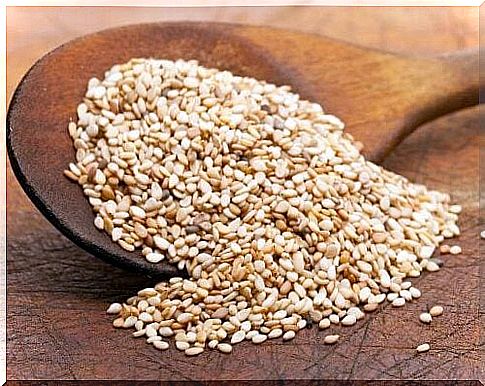Sesame Seeds And Their Nutritional Value

Sesame seeds ( Sesamum indicum ) come from a plant originally from Africa and India. Its spread in the world was due to the slave trade. They preferred to travel with their provisions to ensure a livelihood wherever they went.
First, these seeds are of great protein value, have a large amount of unsaturated fatty acids and minerals such as iron, zinc and calcium, which are very important for the body. In this space, we will show the different types that exist and the benefits they bring to health. Read on.
Types of sesame seeds
black sesame seeds

Black sesame was the first that became known to mankind. These seeds contain the same nutritional properties as whole sesame, however, in addition, they bring high levels of antioxidants.
They are used for their flavor in products prepared in the oven, as when the seeds are roasted and ground, they produce a very tasty aroma and have an intense flavor. The highest quality sesame oil is made from this type of seed.
Unshelled or whole sesame seeds
These unpeeled sesame seeds have increased nutritional values when compared to white seeds. Its calcium content is 8 times higher. It is considered one of the healthiest foods in the world.
Products made from shelled seeds, such as butter and tahini paste, tend to be darker and more bitter creams.
white sesame seeds
White sesame seeds are the most used. They are used for cakes, breads and other baked goods, bringing a crunchy texture.
Contains about 50% oil by weight. In China, white sesame is called “ mah chi ” and in Japan it is known as “ muki-guma ”. It is an essential condiment that brings a delicious flavor and aroma to dishes. In addition, they usually stimulate digestion and provide the beneficial properties of sesame.
Nutritional properties of sesame seeds

Proteins
Although it doesn’t contain all the essential amino acids, sesame seeds, like legumes, are very rich in protein. Combining them with cereals, it is possible to obtain a protein of high biological value. A good way to do this is to add some seeds to the cereal muesli for breakfast.
fats
One of the main components of sesame seeds is undoubtedly its essential fatty acids (omega 3 and 6). These acids are the most important and beneficial to the body’s health.
On the other hand, they are called essential fatty acids because our bodies cannot manufacture them and we need to ingest them through our diet. These fatty acids are extremely beneficial to the cardiovascular system as they lower blood pressure and prevent diseases related to the bad condition of the arteries.
Carbohydrates
Another of the most outstanding properties of sesame seeds is their great supply of fiber, a very special type of carbohydrate. Fiber is essential for maintaining good intestinal health, as it acts like a brush, deeply cleaning the elements that are deposited on the intestinal walls.
Vitamins
Sesame seeds are particularly rich in group B vitamins (B1, B3, B6, folic acid). These vitamins are essential for good skin and tissue health and, therefore, favor the correct functioning of the heart and muscles.
In addition, they contain a significant amount of vitamin E, one of the most antioxidant vitamins, capable of fighting the effects of free radicals.
Minerals
Without a doubt, sesame seeds contain numerous minerals, such as phosphorus, potassium, magnesium, zinc, etc. However, the most outstanding is its extraordinary calcium content. Sesame seeds are one of the richest sources of calcium.
Therefore, it is a crucial food that should not be missing in the diet of boys and girls, as well as in post-menopausal women and pregnant women.
Sesame Benefits

These are the many benefits we can have from regular consumption of sesame seeds:
- Protect the cardiovascular system. Thanks to its polyunsaturated fatty acids that improve the condition of the arteries, causing a lower incidence of hypertension, myocardial infarction, angina pectoris, etc.
- It improves the condition of diabetic people. According to the Journal of Medical Foods , regular consumption of sesame seed oil lowers blood pressure and glucose level in hypertensive diabetics.
- It can improve depression. Thanks to its extraordinary content of the amino acid tryptophan, a precursor of serotonin, which controls stress, anxiety, insomnia, depression and lack of energy.
- Prevent osteoporosis. Studies show that it is thanks to the important calcium content.
- Keeping us young. Its antioxidant vitamins and minerals keep the immune system in top shape and fight free radicals.
- They can protect the digestive tract. Thanks to the action of fibers, protecting the mucous membranes; as well as preventing the appearance of irritations (gastritis, acidity, etc.).
- It can improve oral health. According to Ayurveda (traditional Hindu medicine), leaving the sesame oil in the mouth for a few minutes prevents the formation of cavities, gingivitis, dental plaque and bad breath.









